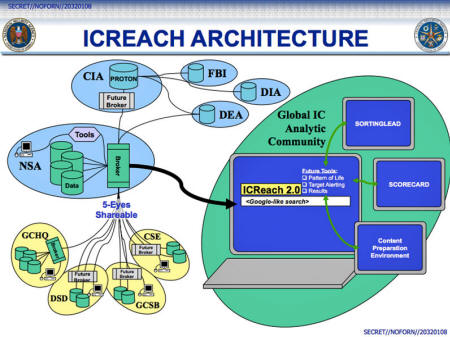|
"Over 850 Billion Records about Phone Calls, Emails, Cellphone Locations, and Internet Chats"
Through creating a search engine in the manner of those pro-transparency pioneers, the intelligence community was turning the tables on the very idea of searchable information.
Why keep it the operating preserve of the public?
The search engine has, as it stands, over 850
billion records about phone calls, emails, cellphone locations, and internet
chats.[1]
The use of ICREACH makes it clear that the Drug Enforcement Administration and the Federal Bureau of Investigation are regular clients and users of the system.
Indeed, it speaks very highly of the "information sharing" ethos of the NSA within the Intelligence Community, channeling Google's operating rationale within more secret spaces.
Furthermore, in 2010, the relevant data base provided the NSA,
Those keen on squirreling information into such a data base are no doubt thrilled by the prospects that it can be made available to the "appropriate" sources.
ICREACH has become one of the largest, if not
largest system for the internal processing and sharing of surveillance
records within the United States. It is not, according to The Intercept,
connected with the NSA database that stores data on Americans' phone calls
pursuant to s. 215 of the Patriot Act.
ICREACH exists outside the system of court orders, being a creature of Executive Order 12333.
The document, instituted by President Ronald
Reagan in 1981, was intended to add robustness to the intelligence gathering
capabilities of the US intelligence community.
He accepts its premise that it is primarily,
However,
The idea of restraining intelligence gathering to pertinent, specific targeting has gotten increasingly old fashioned in the information banquet of the modern NSA community.
Farming modern metadata provides a diet
positively rich in carbohydrates, a deficient diet when it comes to
nutrition, but excessive when it comes to those fats a lean intelligence,
and policing service, should avoid.
In a 2006 letter to John Negroponte, then Director of National Intelligence, Alexander outlined his ideas of a search tool that would,
To what end? Prizing open a "vast, rich source of information".
Superbly dim in a sense - information is not
knowledge; and knowledge is not, on its own accord, information. The glaring
point here is that the higher ups in the intelligence community have gotten
the wrong end of the stick.
It became, as spokesman from the US Office of the Director of National Intelligence Jeffrey Anchukaitis suggested, part of a fundamental "pillar of the post-9/11 intelligence community" - the principle of sharing information between.
Authorities, irrespective of legal distraction or distinction, could obtain data that would otherwise be,
The problems of such data-sharing processes is the mechanical presumption that they take place in a legal vacuum.
On the one hand, members of the intelligence
community are becoming the lounge lizards of bureaucracy. They hug metadata
the way a viewer of cable channel television surfs the package of channels.
Nothing is actually processed. What matters is having the package to begin
with.
According to Brian Owsley, who presided as federal magistrate judge between 2005 and 2013,
Time, it would seem, to burn the fat off the
obese operator that is the modern US intelligence community.
|

